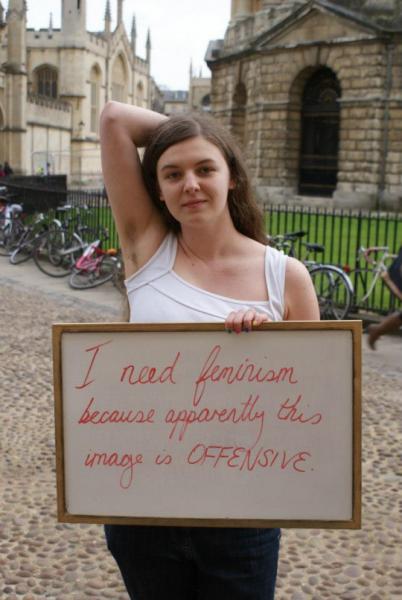The Shaving Strike: A Move For Equality, Not Attention


As the autumn leaves begin to transition shades and pumpkin spice lattes replace summery strawberry smoothies, “No-Shave November” gradually approaches. As a sophomore in high school, I thought the idea of not shaving for a month sounded enticing, so I took a stab at it: for one month, I was free to give up this tedious task and let my hair thicken without judgement from others.
READ MORE: No Shave November: It's Not You, It's Your Facial Hair
After a month of not shaving, I fell in love with my new sense of liberation, freedom and confidence. So I opted to continue not shaving for another month, and another, and another, until five months of exposing my legs in their natural, hairy state had elapsed. Initially, people were shocked, disgusted and confused at my decision not to shave my legs. But as time progressed, more and more people became not only accustomed to, but open-minded about my personal choice.
In fact, my trajectory caused others to take action as well: I gained a small cult of followers who joined me in my revolt against the mainstream societal expectancy of female shaved legs. It felt great. I was making a statement to the world that this is my body, and that I am the one completely in control of how I wish to maintain it based on what makes me feel the most comfortable and beautiful.
READ MORE: 17-Year-Old Organizes #FreeTheNipple Protest, Is Cooler Than Us
Little by little, people began to understand that my choice not to shave my legs for months was not something that I was doing in rebellion, but rather, a choice that I was embracing in order to glorify my body in its natural state, in the way that made me feel best about myself.

However, amid all the attention this anti-shaving, pit-dyeing movement has gotten, there often arises a misconception about why women chose to take part: critics have recently been commenting that they're doing it purely for attention.
This is not the case. As Hunt says in The Washingtonton Post, the movement celebrates “our right to make conscious choices about our bodies.” It is not a grab for attention, but rather, an attempt to give women the choice to groom their bodies in the way that makes them feel the most secure and confident.
From a young age, due to the overwhelming influence of media featuring bare-skinned women, millions of young girls involuntarily acquire the belief that hair on places other than your head is repulsive and masculine, when in fact, it is beautiful and natural.
It was not until the 1940s, when bathing suits began to get skimpy, that women's body hair removal really started to take off. As times progressed, so did the removal of hair. In 1973, the first "pink shot" of an entirely pubic hair-free woman appeared. Soon following, being hairless became the norm. Hair removal became a necessity to some: In 2003, Victoria Beckham announced that she thought Brazilian waxes should be compulsory at age 15.
Some feel pressure from pornography and Playboy to live out a fantasy portrayed throughout both of these media. As Ohio University professor Joseph Slade discovered, by the 1990's more than a third of the models in Playboy appeared to have removed their body hair. And in the new millennium, less than 10 percent of nude models sport the full pubic bush, while a third remove their hair partially and one-quarter remove it completely.

But this is the 21st century, a time when women are granted more opportunities outside Playboy than ever before. Today women make up 46.9% of the American labor force. And according to the Pew Research Center, “Young working women today are making more money relative to men their age than their mothers and grandmothers did.” Women today, while still dealing wtih oppression, are much more equal to men than they were when they started waxing, grooming, and lasering their body hair.
Therefore, when women choose to grow out their hair, they're simply evolving alongside their growing professional success. With greater equalization among other aspects of life, it is only natural for them to reach for the same level of equality and freedom in regards to their bodies.
This is not a movement fueled by a desire for attention, but rather, a direct reaction to the large steps Western society has taken towards equal rights for all genders.
As Hunt says in her “Free Your Pits Manifesto,” women are growing out their hair “because they fail to see the significance in removing it.” As women gain rights legally and professionally, they are finally able to focus on what they want to focus on, and not what society deems they focus on; quite frankly, hair is no longer a priority.
So why not embrace the new trend and embrace your hair in its natural state as well? Everyone has the right to express themselves however they wish, and if growing out your armpit hair or not shaving your leg hair for a few months makes you feel the most comfortable and self-confident, then why the heck not?
Contact Staff Reporter Natalie Raphael here.



